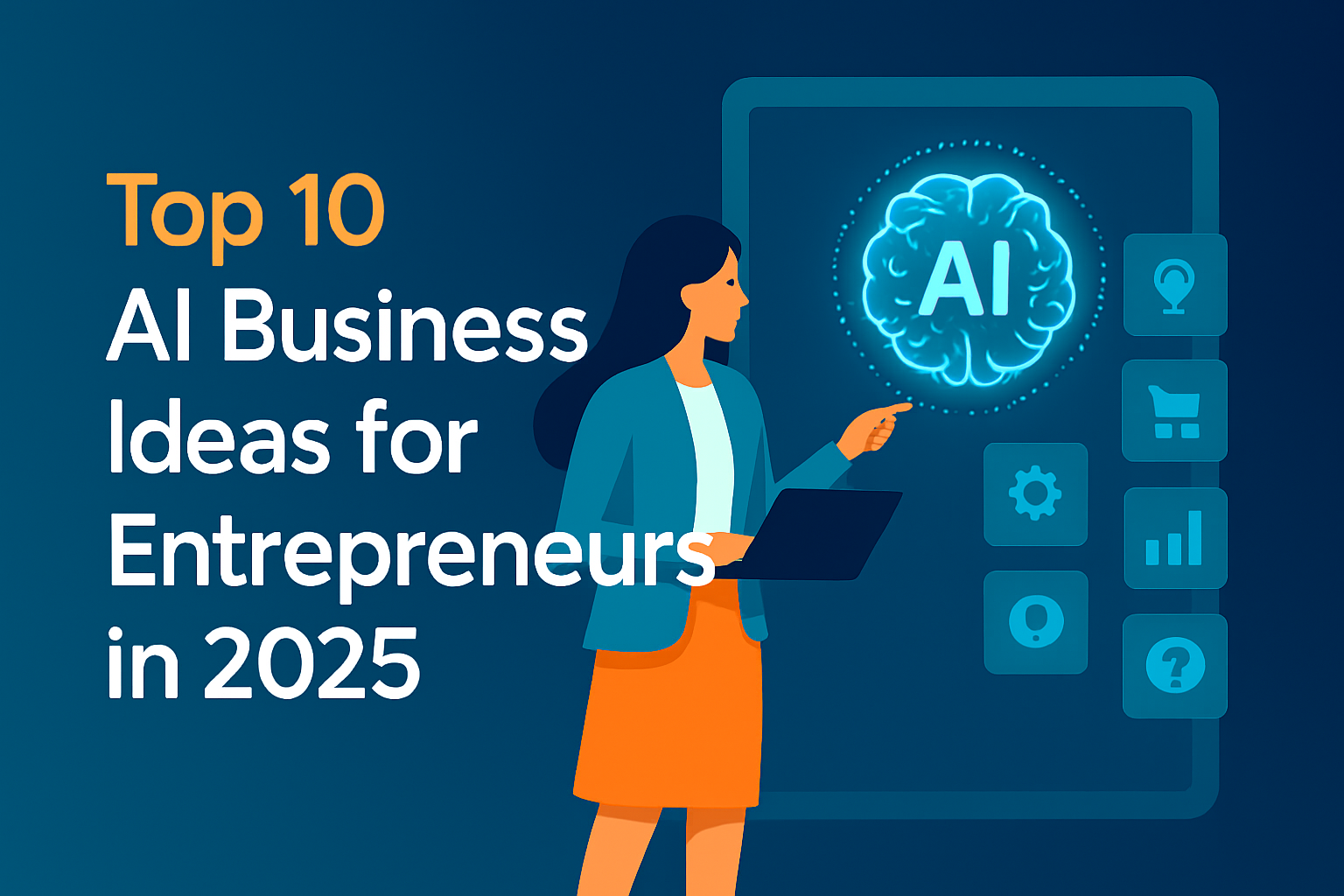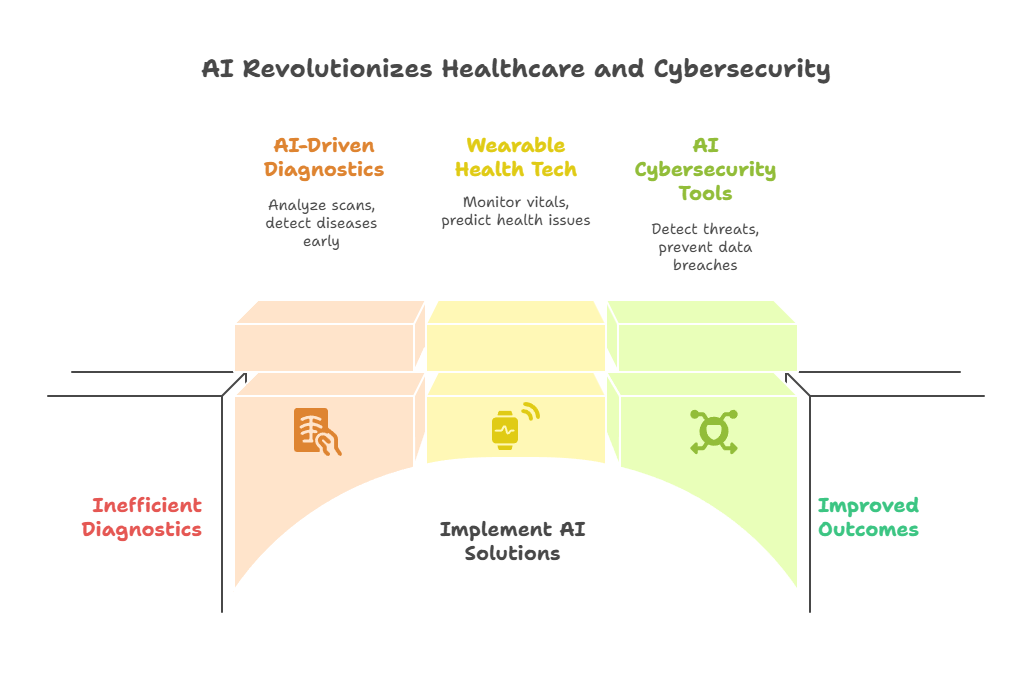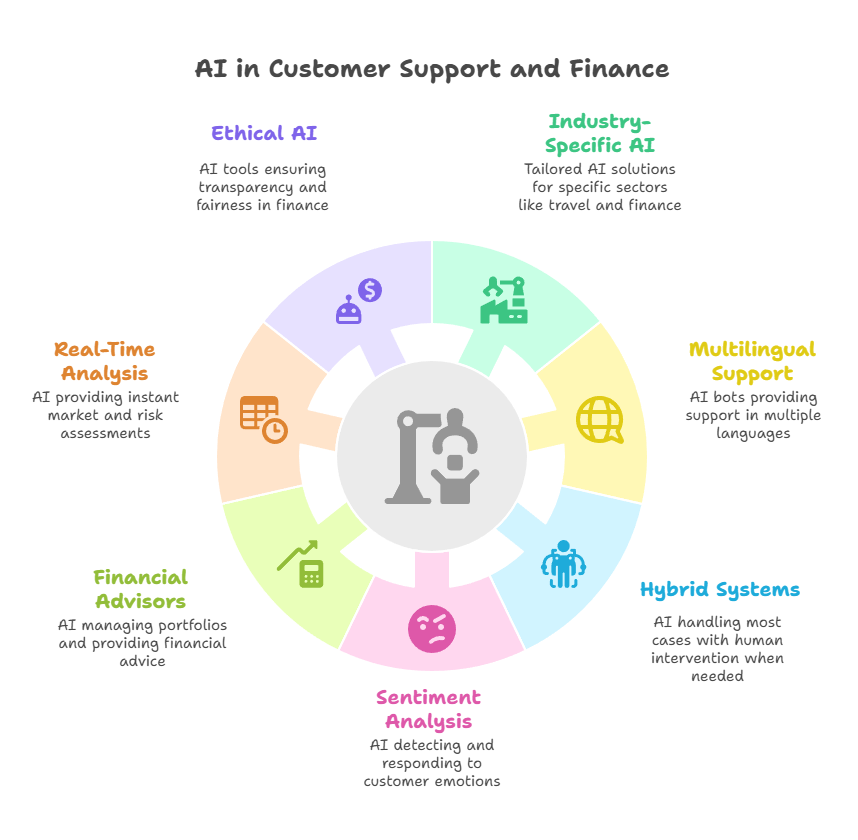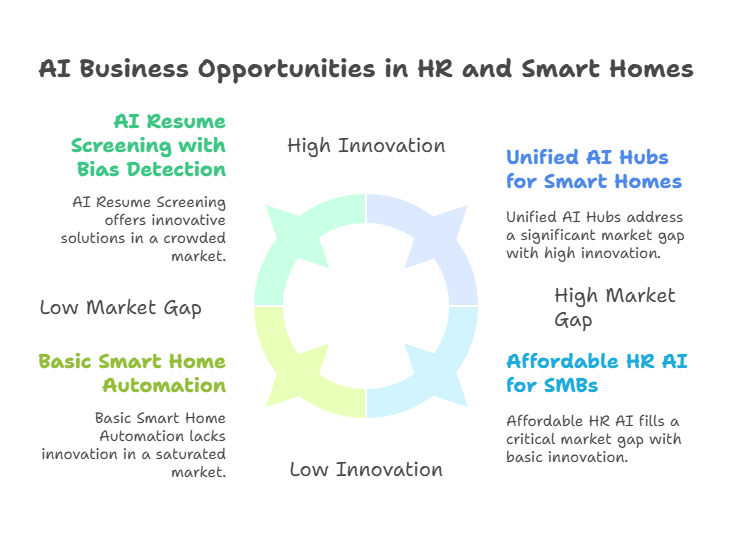
As we look ahead to 2025, one thing is clear: Artificial Intelligence (AI) is no longer just a futuristic concept; it’s the driving force behind the next wave of innovation. From transforming customer experiences to optimizing business operations, AI is reshaping industries across the board and creating an unprecedented number of opportunities for forward-thinking entrepreneurs.
Table of Content
What makes this moment particularly exciting is that building an AI-powered business is more accessible than ever. With the rise of user-friendly tools, open-source models, and low-cost APIs, you don’t need a background in tech or a team of data scientists to get started. Whether you’re a solo entrepreneur, a growing startup, or simply someone with a big idea, AI offers a powerful path to building scalable, future-proof businesses.
In this article, we’re diving into the Top 10 AI Business Ideas for Entrepreneurs in 2025, a carefully curated list of practical, high-demand ventures that leverage today’s most promising AI technologies. From healthcare and finance to e-commerce, education, and cybersecurity, these ideas are backed by real market trends and the growing appetite for smarter, more efficient solutions.
If you’re ready to turn innovation into opportunity, this guide is the perfect starting point. Let’s explore what the future of AI entrepreneurship looks like and how you can lead the way.

Artificial Intelligence is revolutionizing how we manage time, tasks, and teams. One of the top business ideas for 2025 is launching AI-powered virtual assistants tailored for specific industries or demographics. Think Siri or Alexa but smarter, more specialized, and way more efficient. These bots aren’t just answering basic queries anymore. They can now automate daily workflows, manage calendars, make calls, book appointments, and even handle customer service all without human intervention.
Imagine a virtual assistant trained solely for lawyers, capable of organizing case files, setting court reminders, and preparing briefs. Or one for doctors that manages appointment scheduling, pre-screening patient questions, and billing coordination. This niche specialization is where the real money is. Entrepreneurs can build tailored solutions with Natural Language Processing and voice recognition tools that are becoming cheaper and more accessible by the day.
Even better, AI assistants can now learn user behavior over time. They get smarter the more you use them, adapting to your habits, language, and preferences. You can monetize this as a SaaS (Software as a Service) product, with monthly subscription tiers based on features. The demand is massive, especially with remote work still trending and small businesses trying to do more with fewer staff. It’s a low-barrier entry point for startups if you have some basic development resources.
Gone are the days of generic product suggestions. In 2025, consumers expect hyper-personalized shopping experiences and that’s exactly where AI takes center stage. AI-driven personalization tools for e-commerce are booming, and they’ve quickly become one of the most lucrative startup opportunities for entrepreneurs.
Imagine this: you’re running an online store, and every single visitor sees a completely unique homepage customized in real time based on their behavior, browsing history, past purchases, and even the time of day. AI uses this data to deliver hyper-relevant product recommendations, personalized discounts, and dynamic content that speaks directly to each individual shopper. It’s like having a digital salesperson who knows your customer better than they know themselves.
But here’s where things really get exciting for entrepreneurs: AI app development.
Entrepreneurs can develop AI solutions that integrate with popular e-commerce platforms like Shopify, WooCommerce, or Magento. These solutions can offer features such as:
Plus, as privacy concerns grow, there’s a big opportunity to build AI systems that use anonymized data to deliver personalization without compromising user trust. If you can provide tools that balance personalization with compliance (think GDPR or CCPA), you’re tapping into a future-proof niche.
Content is king, but creating high-quality, consistent content is time-consuming and expensive. Enter AI content creation platforms. These tools are changing the game for marketers, bloggers, YouTubers, and social media managers alike. Whether it’s writing long-form articles, generating social media captions, or editing videos, AI is doing it all and doing it well.
AI writing tools like Jasper and Copy.ai are already on the rise, but there’s still so much room for innovation. A great startup opportunity in 2025 lies in building niche content tools for specific industries. For example, imagine an AI tool that writes property listings for real estate agents or creates course outlines for online educators.
Video content is another huge frontier. AI tools now automate everything from script generation to editing, transitions, voiceovers, and subtitles. Tools like Runway and Pictory are showing what’s possible, but there’s still massive potential for platforms that cater to micro-creators and influencers who need faster, cheaper ways to produce quality content at scale.
You can monetize this by offering freemium models basic features for free and premium access for advanced tools. Think about integrations with popular platforms like WordPress, YouTube, Instagram, and TikTok. Add some affiliate features, and you’ve got a viral business model that promotes itself.

AI is saving lives, and that’s not an exaggeration. In 2025, AI-driven diagnostics is one of the most promising areas for tech entrepreneurs. From early disease detection to real-time monitoring, AI is transforming how we approach healthcare.
Startups and healthcare-focused tech companies can dive into AI development by building tools that analyze medical imaging such as X-rays, MRIs, and CT scans. These AI-powered systems can provide doctors with immediate, high-accuracy diagnostics often detecting diseases like breast cancer, pneumonia, or lung abnormalities even earlier and more accurately than traditional methods or human interpretation.
Another area is wearable health tech. Imagine AI systems that constantly monitor vital signs, alert users of irregularities, and predict potential health issues before they escalate. These tools are not only empowering patients but also reducing the burden on healthcare systems worldwide.
Entrepreneurs can collaborate with medical professionals and use anonymized patient data to train these models. There’s even potential for remote diagnostic platforms that serve rural or underdeveloped regions, where access to medical specialists is limited. It’s a high-impact, high-growth sector with a real-world mission behind it.
Cyber threats are evolving daily, and traditional security systems can’t keep up. This is where AI becomes the superhero of digital security. In 2025, one of the smartest moves for entrepreneurs is to build or invest in AI-driven cybersecurity tools.
AI can detect suspicious activity across a network long before a breach occurs. It learns from millions of data points, identifies patterns, and alerts users to anomalies in real-time. Unlike humans, AI doesn’t sleep. It works 24/7, constantly scanning for risks.
Startups can create AI tools that handle:
With businesses moving online and digital assets becoming increasingly valuable, companies are investing more than ever in proactive security. If you can build an AI tool that provides enterprise-grade protection for small and mid-sized businesses at an affordable price, you’ve got a goldmine.
AI in cybersecurity is not just about defense—it’s about prediction, adaptation, and automation. And with data breaches costing businesses millions, there’s a pressing need for innovative, AI-based solutions that evolve as fast as the threats do.
Customer service has always been a cornerstone of business success, but in 2025, it’s being redefined by artificial intelligence. AI-powered customer support solutions are helping companies scale support operations without compromising service quality. If you’re looking for a scalable, high-demand AI business idea, this one’s golden.
Instead of relying on large call centers and human agents, businesses are turning to AI chatbots, voice assistants, and automated help desks. These tools can handle thousands of customer queries simultaneously 24/7 across multiple languages and platforms. And the best part? They’re improving by the second, thanks to machine learning and sentiment analysis.
But here’s where entrepreneurs can shine: by building industry-specific AI support tools. A SaaS customer support AI that specializes in the travel sector, for example, could help travelers change bookings, check flight statuses, or rebook hotels. One for the finance industry could assist users with account information, transaction tracking, or fraud alerts.
The biggest opportunities lie in:
These solutions significantly cut down customer wait times, increase satisfaction rates, and reduce staffing costs, making them an irresistible offer for SMBs and enterprises alike.

The world of personal finance and investing is ripe for AI disruption. In 2025, AI financial advisors (also known as robo-advisors) are becoming more than just budgeting apps they’re sophisticated platforms capable of managing entire portfolios, predicting market trends, and offering personalized investment strategies.
Startups can build platforms that cater to beginner investors, small business owners, or even high-net-worth individuals looking for algorithm-backed insights. These AI tools analyze user financial history, risk tolerance, and goals to create tailor-made investment portfolios. They also use real-time data to make adjustments and recommendations on the fly.
Some unique features you can develop:
The future of finance is about automation and personalization. Imagine an AI platform that sends you a daily message: “Hey, your spending is 18% higher this week would you like to adjust your savings target?” That’s the level of intimacy and proactiveness users now demand.
There’s also a growing need for ethical AI in finance. People want transparency and fairness in how their money is handled. By building trustworthy, secure, and regulation-compliant tools, you can tap into this trust economy while offering immense value.
Hiring the right talent is one of the most important and often most challenging tasks for any business. That’s why AI in HR is becoming a major trend in 2025, opening up massive opportunities for startups focused on recruitment automation and employee management.
AI can now scan thousands of resumes in seconds, analyze candidate behavior during interviews, and even predict cultural fit. For HR teams overwhelmed by job applications, AI is a game-changer. It’s not just about filtering resumes—it’s about making better hiring decisions faster.
Here are a few AI business ideas in this space:
One of the biggest gaps in the market is affordable, easy-to-use HR AI tools for small and medium businesses. Most SMBs still use manual systems or outdated software. Offering them a plug-and-play solution that’s budget-friendly could position your startup as a must-have HR tool.
And let’s not forget post-hiring. AI can help monitor employee performance, detect burnout risks, and improve workplace satisfaction through predictive analytics. If you can help companies attract, retain, and grow their people using AI, you’re solving a billion-dollar problem.
Smart homes are no longer science fiction. From smart lights to AI thermostats, home automation is exploding and in 2025, the opportunity to build intelligent systems that control everything from entertainment to security is bigger than ever.
But here’s the twist: today’s consumers want interoperability and intelligence. It’s not enough to turn the lights off with your phone. They want an AI that knows when to dim the lights based on mood, weather, or time of day. They want it to lock doors, adjust thermostats, and start the coffee machine before they even get out of bed.
Entrepreneurs can build:
The smart home industry is fragmented with different brands, different apps, and little communication between devices. There’s a huge demand for unified AI platforms that can sync everything and make homes truly “smart.” Think of it as creating the brain of a home.
What’s more, people are increasingly prioritizing privacy and data control. If you can offer smart home AI that’s secure, encrypted, and user-friendly, you’ll attract tech-savvy users looking for a future-ready solution without compromising safety.

Education is undergoing a digital transformation, and AI is right at the heart of it. In 2025, online learning is no longer just about access—it’s about personalization, interactivity, and adaptability. AI is making education smarter, faster, and more engaging.
Entrepreneurs have a golden opportunity to develop platforms that cater to different learning styles, speeds, and goals. Imagine an AI tutor that adapts in real time, simplifies complex topics, offers interactive quizzes, and tracks student progress with precision.
Here are some winning AI business ideas in EdTech:
There’s a growing demand for micro-learning platforms, bite-sized, skill-based learning powered by AI. These tools are perfect for busy professionals, hobby learners, and even kids. Combine gamification, AI tracking, and community features, and you’ve got an engaging product that keeps users coming back.
Also, consider building for corporate training. Companies need to train employees fast and at scale, and AI can create customized learning journeys that align with business objectives.
Whether it’s K-12 education, college prep, or professional upskilling, AI in education is a future-proof business idea with massive global potential.
The AI revolution is no longer coming; it’s already here, and it’s accelerating faster than most of us can keep up. For entrepreneurs, this presents an extraordinary opportunity to get ahead of the curve, tap into booming industries, and solve real-world problems with smart, scalable solutions.
What makes AI especially powerful in 2025 is its accessibility. You don’t need a Ph.D. in machine learning or a massive development team to create something meaningful. With the right tools, a clear vision, and a focus on a specific market need, launching an AI-powered business is within reach for just about anyone willing to learn and take action.
The 10 business ideas we’ve explored, from virtual assistants and e-commerce personalization to AI-driven healthcare and EdTech platforms, are not just trendy concepts. They’re rooted in growing demand and supported by the real-world success of startups that are already making waves. The time to act is now.
Whether you’re aiming to build a SaaS product, offer a specialized service, or create something entirely new, let this be your sign: the AI space is ready for your ideas.
Embrace innovation. Solve real problems. And don’t be afraid to experiment because in the world of AI, the possibilities are only limited by your imagination.
